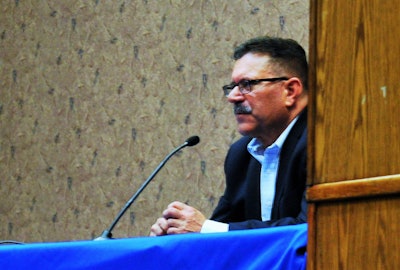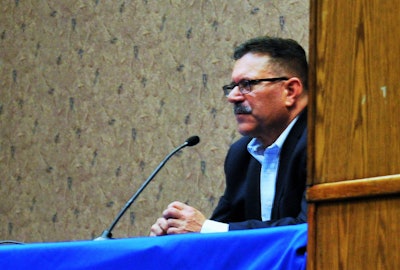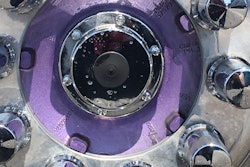
FMCSA Administrator Ray Martinez's MATS listening session
FMCSA Administrator Ray Martinez is fielding truckers' questions at MATS.
Posted by Overdrive Magazine on Friday, March 23, 2018
Why was the ELD mandate promulgated?
Congress made us do it.
Status of the Owner-Operator Independent Drivers Association’s petition for a small-business exemption for proven safe motor carriers?
We’ll get back to you.
Can we get a CDL holder at the top of the FMCSA already?
[Next question…]
Is more flexibility in the hours of service in the offing?
Well, about that …
 FMCSA Administrator Ray Martinez
FMCSA Administrator Ray MartinezThe above gross simplification of a variety of the questions directed toward new Federal Motor Carrier Safety Administrator Ray Martinez during a listening session scheduled for 1:30 p.m. Friday, March 23, at the Mid-America Trucking Show in Louisville, Ky., at least fairly well captures the dynamics on offer in the room. Speaking of the room, it was half-full at best through much of the time, which may have been a function of the fact that the session was added late to the show schedule — Overdrive learned about it late the prior day, during an interview with Martinez. Its hour and a half duration you can view above via video from our live feed to the magazine’s Facebook page, where commenters were numerous and varied in their responses during a variety of moments. “I wish this room was packed,” noted Kenneth Edward Fiantago Sr.

The 14-hour clock “just needs to go away,” wrote Jared Jackson, near the end of the discussion, much of which centered on the hours of service regulations. If drivers walked away with any hope for change for the better with new leadership at the top of the FMCSA, the possibility for more flexibility in the hours regs may be where such hope now sits.
In his response to the first question out of the gate, from a small fleet owner in attendance querying Martinez about the possibility of some relief from the electronic-logging-device requirement, the Administrator, on the job now for just four weeks, said he’d “already realized [that] ELDs may not be the issue here.” Rather, “it’s the hours of service. … We may have some latitude to see what we could do with hours.”
New widespread use of electronic logging devices has put the problem of hours of service rigidity front and center, Martinez recognized, likewise what he called “some inefficiencies in the supply chain” at shippers and receivers who have been less-than-prompt in adjusting to the new logs reality. “If ELDs help to spotlight that there’s … a problem here,” he said, “we could use that to your advantage.”
![From left, Good Energy small fleet owner Al Burton, Faithful Logistics owner David Sheriff and Express Loads’ Horacio Carmichael were among truckers in attendance. Burton, in the industry for six years and now with five trucks, said trucking changed his and “my family’s life…. This is a very vital industry to the world.” Speaking to Administrator Martinez, he asked, “Is it possible that [the ELD mandate] might have been rolled out prematurely? Some of the [hours, detention and other] concerns that these guys have should have been addressed first – rather than pushed out and all this chaos” allowed to ensue.](https://img.overdriveonline.com/files/base/randallreilly/all/image/2018/03/ovd.Al-Burton-David-Sheriff-Horacio-Carmichael-2018-03-24-08-24.png?auto=format%2Ccompress&fit=max&q=70&w=400) From left, Good Energy small fleet owner Al Burton, Faithful Logistics owner David Sheriff and Express Loads’ Horacio Carmichael were among truckers in attendance. Burton, in the industry for six years and now with five trucks, said trucking changed his and “my family’s life…. This is a very vital industry to the world.” Speaking to Administrator Martinez, he asked, “Is it possible that [the ELD mandate] might have been rolled out prematurely? Some of the [hours, detention and other] concerns that these guys have should have been addressed first – rather than pushed out and all this chaos” allowed to ensue.
From left, Good Energy small fleet owner Al Burton, Faithful Logistics owner David Sheriff and Express Loads’ Horacio Carmichael were among truckers in attendance. Burton, in the industry for six years and now with five trucks, said trucking changed his and “my family’s life…. This is a very vital industry to the world.” Speaking to Administrator Martinez, he asked, “Is it possible that [the ELD mandate] might have been rolled out prematurely? Some of the [hours, detention and other] concerns that these guys have should have been addressed first – rather than pushed out and all this chaos” allowed to ensue.![Owner-op Dean Carnahan, in a related interview at MATS, remarked on the growing value of owner-op and driver teams and the market effects of the ELD mandate. While he sees clear to the roadside realities of rigid hours accounting — and by no stretch is he exactly happy about the change — the freight-rate rise that’s occurred since the mandate went into effect is a clear positive. But, he believes, “This is not the new normal,” unfortunately. “Trucking is the barometer of the economy, and the economy is good but it’s not that good. Give [the spot-rate boom] another year or two at the most.”](https://img.overdriveonline.com/files/base/randallreilly/all/image/2018/03/ovd.Dean-Carnahan-2018-03-24-08-32.png?auto=format%2Ccompress&fit=max&q=70&w=400) Owner-op Dean Carnahan, in a related interview at MATS, remarked on the growing value of owner-op and driver teams and the market effects of the ELD mandate. While he sees clear to the roadside realities of rigid hours accounting — and by no stretch is he exactly happy about the change — the freight-rate rise that’s occurred since the mandate went into effect is a clear positive. But, he believes, “This is not the new normal,” unfortunately. “Trucking is the barometer of the economy, and the economy is good but it’s not that good. Give [the spot-rate boom] another year or two at the most.”
Owner-op Dean Carnahan, in a related interview at MATS, remarked on the growing value of owner-op and driver teams and the market effects of the ELD mandate. While he sees clear to the roadside realities of rigid hours accounting — and by no stretch is he exactly happy about the change — the freight-rate rise that’s occurred since the mandate went into effect is a clear positive. But, he believes, “This is not the new normal,” unfortunately. “Trucking is the barometer of the economy, and the economy is good but it’s not that good. Give [the spot-rate boom] another year or two at the most.”
Lee Schmitt, whose One20 company-wrapped truck and trailer regular readers may recall from prior coverage of the October anti-ELD mandate demonstrations, followed by echoing the administrator on his point about the hours of service being at the crux of truckers’ frustrations with ELDs. “The 14-hour clock has to go,” he said, adding that for decades 10 on, 8 off with a maximum of split-rest flexibility was the norm. Plenty drivers got along just fine, he noted, and safely, under the old rules.
Small fleet owner and OOIDA board member Monte Wiederhold would later echo that contention, going on to query the administrator about hours exemptions that are occasionally granted to propane and other haulers during energy emergencies. Why is it “OK for these guys to go off the clock, so to speak?”
Fundamentally, OOIDA’s current acting president, Todd Spencer, questioned the necessity of the ELD mandate as it relates to drivers who’ve shown near perfection through years of at-fault accident-free experience. “I think it sort of questions logical thinking to focus enforcement efforts and dollars on drivers that count their safe miles by the millions.”
Martinez stressed the agency was seriously considering the merits of the association’s ELD exemption request for truckers with truly safe records but did not offer a timeline for a decision.
Throughout the session, too, Martinez routinely emphasized that the administration was finally well aware of hours of service issues, principally of the need for flexibility in order to make appropriate safety calls without hitting the wallet. Delorenzo told Overdrive that the split-sleeper flexibility study FMCSA’s in the early stages of putting in place continued to move forward through the White House Office of Management and Budget’s approval process. That study, many believe, has the potential to result in new options to “stop the 14-hour clock” with mid-duty-period rest.
But with growing attention from so many truckers on hours and taking concerns to their Congressional representatives and directly to the agency, Martinez cautioned that if Congress gets involved, the end result might not be something that the owner-operators in the room liked, necessarily. “If Congress decides to take [hours of service] up again,” he said, “you never know what’s going to come out of that.”
In the meantime, Martinez pledged to listen to the entire trucking community, including associations like the American Trucking Associations and OOIDA.
“The ATA does not represent us!” duly came the shouts, some noting that OOIDA didn’t represent them either.
Working toward hours changes through FMCSA directly through stakeholder input, those truckers suggested, could be something of a wild card as well. It all depends on whose voice truly gets heard.
Video of the full session is available at the top of this post.











